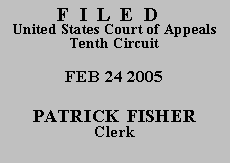

|
PATRICK E. THOMAS, |
|
Before EBEL, MURPHY, and McCONNELL, Circuit Judges.
On January 9, 2003, Appellant Patrick E. Thomas filed a compliant in federal district court alleging that Appellee discriminated against him while he was employed by the Central Oklahoma Juvenile Center. Thomas mailed the summons and complaint by certified mail to Tony Sardis. Mr. Sardis is the Supervisor for Federal Grants for the Oklahoma Juvenile Center. Appellee entered a special appearance and moved to dismiss Thomas' complaint, arguing the summons was not served on the proper person. See Fed R. Civ. P. 4(j)(2); Okla. Stat. tit. 12, § 2004(C)(1)(c)(5). Appellee supported its motion with an affidavit stating that Mr. Sardis is neither the chief executive officer of the State of Oklahoma, the chief Executive Officer of the Office of Juvenile Affairs, nor the officer or individual whose duty it is to maintain the official records of the State of Oklahoma or of the Office of Juvenile Affairs.
On March 18, 2003, the district court granted Appellee's motion and dismissed Thomas' complaint without prejudice. The court noted that Thomas had failed to respond to the Appellee's motion or contest the factual allegations made in the supporting affidavit, and had made no further attempt to serve the summons and complaint. Thomas appealed.(1)
Pursuant to Rule 4(m) of the Federal Rules of Civil Procedure, a district court may dismiss an action without prejudice if the plaintiff fails to serve the summons and complaint upon the defendant within 120 days. See Scott v. Hern, 216 F.3d 897, 912 (10th Cir. 2000). The district court dismissed Thomas' complaint sixty-eight days after it was filed. Accordingly, we conclude that the district court abused its discretion when it dismissed Thomas' complaint.
The judgment of the district court is reversed and the matter remanded for further proceedings not inconsistent with this opinion.
ENTERED FOR THE COURT
Michael R. Murphy
Circuit Judge
*. This order and judgment is not binding precedent, except under the doctrines of law of the case, res judicata and collateral estoppel. The court generally disfavors the citation of orders and judgments; nevertheless, an order and judgment may be cited under the terms and conditions of 10th Cir. R. 36.3.
1.Thomas' notice of appeal filed on April 18, 2003, was timely because the district court failed to enter judgment in a separate document. See Fed. R. Civ. P. 58(b)(2)(B).